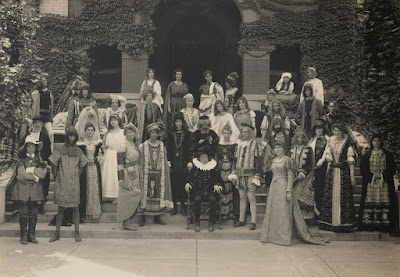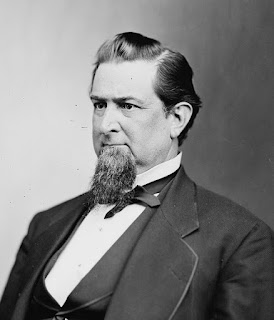Mary Settle Sharpe (1863-1944) was a woman ahead of her time, in both education and politics. She was an early member of the faculty of State Normal and Industrial College (UNC Greensboro) and was also the first woman nominated for public office in the state of North Carolina after the ratification of the 19th Amendment in 1920.
The daughter of a Rockingham County judge and politician, she attended Salem Academy and graduated from St. Mary’s School in Raleigh before marrying Edgecombe County lawyer Benjamin Charles Sharpe in 1884. The Sharpes moved to Greensboro in 1897 and would eventually have six children. In 1896, Mary became one of the first married women faculty members at the State Normal, residing with her family in a house near campus on South Mendenhall Street. She became known for her friendliness, her beautiful singing voice, her impressive literary interpretations, and her tireless interest in the students in her charge. Equally popular with students and faculty, Professor William C. Smith described Mary as “keen in intellect, yet kindly at heart and democratic in sympathy … always gracious, courteous, just and true.”
During the early years of State Normal, the faculty was not always specialized and Mary taught a variety of classes across several departments. Her positions included Director of Physical Training, Instructor of History, and Head of the Department of Expression. Mary’s efforts were especially appreciated in the area of campus productions. As chairman of the faculty committee on entertainments, she was in charge of student plays and the school’s May Day festivals. Especially elaborate were the May Day celebrations held in the years 1912 and 1916, which involved the participation of State Normal students and faculty, as well as the younger children who attended the practice school on campus. These particular pageants included parades down College Avenue, a variety of plays presented on the school grounds, and the crowning of the May Queen.
Always an advocate of women’s rights, Mary resigned from the college in 1920, after the passage of the 19th Amendment, to become more involved in politics. It is not surprising that she felt drawn to this vocation, as she came from generations of politicians and public servants. Her father, Thomas Settle, Jr., had been a lawyer and the son of a Congressional Representative from North Carolina, also named Thomas Settle. He held important positions in the state government, serving as a legislator, Speaker of the House, President of the Senate, State Solicitor, and Associate Judges of the Supreme Court. Settle also helped found the state’s Republican Party during Reconstruction, and was nominated by President Ulysses S. Grant to a seat on the US District Court for the Northern District of Florida. Mary’s brother, Thomas Settle III, also had an illustrious career in the government.
Mary, like her family, had always been interested in politics. She was considered “progressive and impatient with all forms of injustice.” Mary served as the chair of the state Republican Executive Committee for Women and accepted the Republican nomination for state Superintendent of Public Instruction in 1920. She wrote letters and spoke at events throughout the state asking for support – “especially from the ladies.” Only a month after women had gained the right to vote, she wrote a letter to the “Womanhood of North Carolina,” laying out a platform that would “lift North Carolina’s school system out of partisan politics” and “educate all the children of all the people.” She also advocated for better salaries for teachers.
Mary’s candidacy had wide and enthusiastic support from her former colleagues and students at North Carolina College for Women,* who attended many of her talks. She traveled the state attending local political events and encouraging the women of North Carolina to “help purify the ballot box” and urged women to exercise their new right to vote. Hailed as an “eloquent and captivating” speaker, Mary campaigned for the improvement of education and the importance of citizenship. Although she lost the election, she remained very involved in state politics, chairing the state organization of women.
Mary lived over eighty years. Growing ill at the end of her life, she spent her last eight months at Cox Restorium in Winston-Salem. She was buried next to her husband at the Holy Trinity Episcopal Church Cemetery in Ashe County where they had kept a country home. Mary has been honored by UNC Greensboro on several occasions since her death in 1944. In 1997, she was inaugurated into the UNC Greensboro’s Theatre Hall of Fame for her encouragement of the dramatic program during the early years of the school. Additionally, the University established the Mary Settle Sharpe Award for Teaching Excellence, recognizing outstanding success in facilitating student learning. There is also a conference room dedicated to her memory in the Elliott University Center.
* State Normal had changed its name to North Carolina College for Women in 1919.
By Kathelene McCarty Smith


